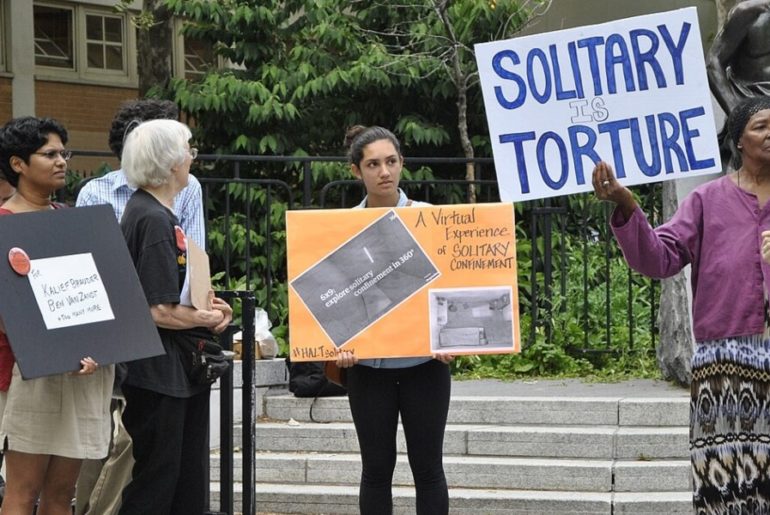Senator Dick Durbin (D-IL) and cosponsors: Cory Booker (D-N.J.), Kamala Harris (D-CA) and Brian Schatz (D-HI), introduced a bill to limit the use of solitary confinement and other forms of restrictive housing in immigration detention. Senate Bill 2870 was introduced on Thursday, October 14, to the Committee on the Judiciary. “Research shows that solitary confinement can cause permanent psychological harm,” Durbin said.
In a press release, the bill’s cosponsors state that this bill is presented “following reports from the Project on Government Oversight, The Washington Post, NBC News, and others that solitary confinement is significantly overused in federal immigration detention,” and “to combat the rampant and unnecessary overuse of solitary confinement in U.S. Immigration and Customs Enforcement (ICE) operated and ICE contract facilities.”
The Project on Government Oversight (POGO), report records documenting 6,559 instances where solitary confinement was used in ICE detention centers (January 2016 to May 2018). More than 4,000 records show detainees in solitary for more than 15 days, 2579 solitary confinements of detainees with mental illness, and 989 solitary confinements of detainees with mental illness lasting over 15 days.
NBC News with the International Consortium of Investigate Journalist (ICIJ, Solitary Voices) points out that “The data documents 8,488 cases of immigrant detainees placed in isolation over the five-year period…One out of every 200 detainees spends time in isolation for at least two weeks, according to ICE data.”
The reasons for solitary confinement are alarming. “The inspector general team also found people wrongly placed in disciplinary solitary when they requested solitary for protective reasons (the conditions in disciplinary solitary are more harsh),” according to the POGO investigation.
The United Nations mentioned that solitary confinement or “segregation” as it is called within ICE, should be banned except in “very exceptional circumstances.” It should never be used to isolate people with mental disabilities or juveniles — and no one should be held for longer than 15 days.
The isolation can cause severe, and long-lasting, psychological and physical damage, the International Consortium of Investigative Journalism analyzed the following data:
– At least 573 placements were for 90 days or more.
– At least 32 placements lasted longer than a year.
– Nearly one-third of placements involved detainees described as mentally ill.
– In 373 incidents, a detainee was placed on a suicide watch in a solitary confinement cell.
– Another 207 incidents described detainees moved from solitary confinement to suicide watch.
– At least 13 detainees who later died in ICE detention have spent time in solitary, according to records dating back to 2011.
“This legislation requires ICE to comply with specific safeguards to ensure individuals are treated more humanely and ICE is not adding to the trauma many of these people have already been subjected to.” Harris said.
To address the “cruel, demeaning and abusive” nature of solitary confinement, as described by Senator Booker, this legislation will require the following reforms (*) :
1. To set strict standards for the use of solitary confinement in immigration detention. This includes allowing the detained to have as much meaningful interaction with others (Other detained, counsel, visitors, clergy, etc.)
2. Specific limitations of the amount of time a detainee can spend in solitary (duration of not more than 14 consecutive days, and not more than 14 days in a 21-day period, unless is a special case)
3. To have protective custody or if it is requested, to be transferred to a safer place.
4. To consider the most vulnerable people for that prohibit the use of solitary confinement for detainees are: younger than 18 years old; have a serious mental illness; have a physical or intellectual disability; is lesbian, gay, bisexual, transgender, etc.; HIV positive; are pregnant or have recently given birth.
5. To protect the rights of detainees and improve access to counsel and mental health care.
6. Right to review placement in solitary confinement and to have all the information, documents, files, relating to the detained case. This also includes having real data of the detainees for that this legislation proposes to establish a weekly tracking system to monitor the use of solitary confinement and impose new transparency and accountability measures.
(*) S. 2870. SEC. 3. Solitary Confinement Reforms

